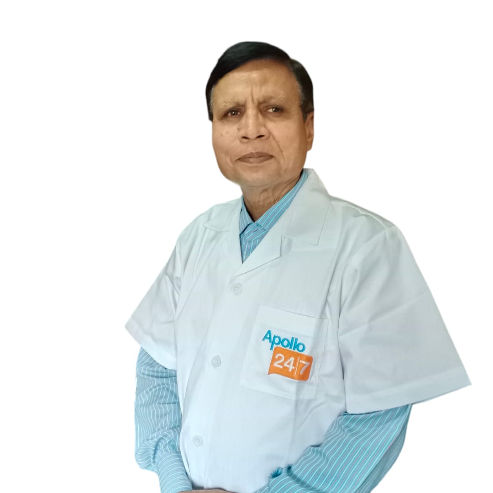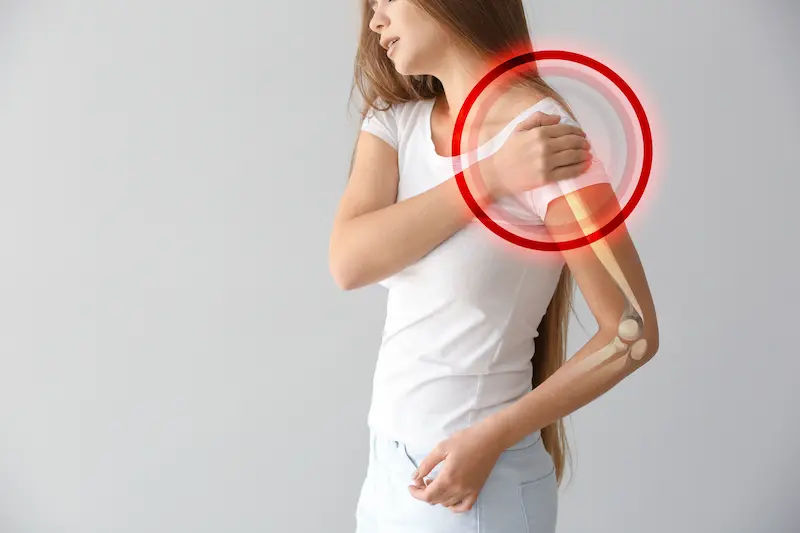Guide to Shoulder Pain What Could Be Reason
Discover common causes of shoulder pain, including injuries, posture issues, and medical conditions. Learn symptoms, diagnosis, and when to seek treatment.

Written by Dr. Rohinipriyanka Pondugula
Reviewed by Dr. Dhankecha Mayank Dineshbhai MBBS
Last updated on 13th Jan, 2026

That nagging ache when you reach for a high shelf or a sharp, stabbing sensation that wakes you up at night shoulder pain is a common and frustrating complaint that can stem from a surprising number of sources. As one of the body's most complex and mobile joints, the shoulder is a marvel of engineering but also prone to a variety of issues, from simple strains to more serious degenerative conditions. Understanding the reason behind your shoulder pain is the critical first step toward effective treatment and lasting relief. This guide will walk you through the intricate anatomy of the shoulder, explore the most common, and some unexpected, causes of discomfort, and outline the pathways to diagnosis and recovery. Whether your pain is a recent development or a chronic burden, we’re here to help you decipher its origins.
Understanding Your Shoulder's Complex Anatomy
To understand why your shoulder hurts, it helps to know what makes it work. The shoulder isn't a single joint but a complex network of bones, tendons, muscles, and ligaments working in concert to provide an incredible range of motion—which also makes it vulnerable to injury.
The Ball-and-Socket Joint
At its core, the shoulder is a ball-and-socket joint. The "ball" is the rounded top of your upper arm bone (humerus), which fits into the "socket," a shallow cup-shaped part of your shoulder blade (scapula) called the glenoid. This shallow socket allows for great movement but offers little inherent stability, relying on other structures to keep everything in place.
The Rotator Cuff: Your Shoulder's Stabilizer
This is perhaps the most famous shoulder component for all the wrong reasons. The rotator cuff is a group of four muscles and their tendons that surround the shoulder joint. Their job is to hold the ball of your humerus firmly into the socket and to power the rotating and lifting motions of your arm. Injuries here are a primary reason for shoulder pain.
Bursae and Tendons: The Smooth Operators
To prevent friction between the moving parts, small, fluid-filled sacs called bursae act as cushions. Tendons are the tough, fibrous cords that attach muscles to bones. Inflammation of these structures, bursitis or tendinitis, is a common source of pain, often caused by repetitive overhead activities.
Consult a Top Orthopedic Specialist
Common Causes of Shoulder Pain
Shoulder pain generally falls into a few key categories: acute injury, gradual wear-and-tear, and inflammatory conditions.
Injuries and Trauma (Acute Pain)
A fall, a sudden pull, or a direct blow can cause immediate and severe pain.
Rotator Cuff Tear: This can happen suddenly from a single injury (like falling on an outstretched arm) or develop gradually from repetitive stress. It causes a deep dull ache, weakness, and difficulty lifting the arm, often accompanied by a sharp pain in shoulder when lifting the arm overhead.
Fractured Collarbone or Arm Bone: A break in the clavicle (collarbone) or the proximal humerus (top of the arm bone) is common in falls and causes intense, immediate pain, swelling, and an inability to move the arm.
Shoulder Dislocation or Separation: A dislocation occurs when the ball is forced completely out of the socket. A separation involves the stretching or tearing of the ligaments where the collarbone meets the shoulder blade. Both are intensely painful and result in a visible deformity.
Wear and Tear (Degenerative Pain)
Over time, the structures within the shoulder can simply wear down.
Osteoarthritis: The "wear-and-tear" arthritis where the protective cartilage that cushions the ends of the bones wears away. This leads to pain, stiffness, and a grinding sensation (crepitus) during movement.
Rotator Cuff Tendinitis and Bursitis: Often linked, these are classic overuse injuries. Tendinitis is inflammation of the tendons, and bursitis is inflammation of the bursa. They are common in painters, athletes, and anyone with jobs requiring repetitive overhead motion, causing a persistent ache on top and outside of the shoulder.
Inflammation and Stiffness
Some conditions cause pain primarily through inflammation and a resulting loss of movement.
Frozen Shoulder (Adhesive Capsulitis): This condition involves a thickening and tightening of the flexible tissue surrounding the shoulder joint. It develops slowly in stages, freezing (increasing pain and stiffness), frozen (pain eases but stiffness remains), and thawing (motion returns). The reason is not always clear but is more common in diabetics and after prolonged immobilization.
Rheumatoid Arthritis: An autoimmune disorder where the body's immune system attacks its own joints, causing painful inflammation that can erode bone and deform joints. It typically affects both shoulders.
When the Pain Isn't From Your Shoulder: Referred Pain
Sometimes, the shoulder is merely the messenger. Referred pain occurs when a problem elsewhere in the body sends pain signals to your shoulder area.
Neck and Spinal Issues (Pinched Nerve): A herniated disk or bone spur in your cervical spine (neck) can compress a nerve that leads to your shoulder. This often causes a deep, burning pain or a sensation of pins and needles that radiates from the neck down over the shoulder blade and into the arm, rather than being focused solely in the joint itself.
Gallbladder, Liver, or Heart Problems: This is a critical distinction. Pain from a gallstone or liver issue can refer to the right shoulder. More seriously, a heart attack or angina (heart pain) can manifest as pain, pressure, or a squeezing sensation in the left shoulder, jaw, or arm. This is why sudden, unexplained left shoulder pain, especially if accompanied by chest tightness or shortness of breath, requires immediate medical attention.
How is the Reason for Shoulder Pain Diagnosed?
Pinpointing the exact cause requires a medical professional. The process usually starts with a detailed history and physical exam.
The Doctor's Physical Exam: Your doctor will ask about your pain (when it started, what makes it better or worse), your daily activities, and any history of injury. They will then physically examine your shoulder, checking for swelling, tenderness, deformity, and muscle strength. Most importantly, they will assess your range of motion, asking you to move your arm in specific ways to isolate the affected structures.
Imaging Tests: X-Rays, MRI, and Ultrasound: If the cause isn't clear, imaging can provide a definitive look inside.
X-rays show bones excellently, revealing fractures, arthritis, and dislocations.
MRI scans provide detailed images of soft tissues like muscles, tendons, ligaments, and bursae, making them ideal for diagnosing rotator cuff tears and other soft-tissue injuries.
Ultrasound is great for visualizing soft tissues in real-time, showing tendons and muscles as they move.
If your shoulder pain persists beyond a week or two of home care, it's crucial to get a professional diagnosis. You can consult a specialist online with Apollo24|7 for an initial evaluation and to determine if you need imaging tests.
General Treatment Options for Shoulder Pain
Treatment is entirely dependent on the underlying cause and severity.
At-Home Care and Remedies (R.I.C.E. method): For minor strains and sprains, the R.I.C.E. protocol is a good first step: Rest (avoid painful movements), Ice (reduce inflammation), Compression (minimize swelling), and Elevation. Over-the-counter anti-inflammatory drugs like ibuprofen can also help manage pain and swelling.
Physical Therapy and Rehabilitation: This is a cornerstone of treatment for most shoulder issues. A physical therapist can teach you specific exercises to restore flexibility, strengthen the muscles that support the joint, and improve your range of motion. This is especially effective for rotator cuff injuries, frozen shoulder, and post-surgical recovery.
Medical Interventions: Injections and Surgery: If conservative measures fail, a doctor may recommend a corticosteroid injection into the joint to powerfully reduce inflammation and pain. For severe issues like complete rotator cuff tears, recurrent dislocations, or advanced arthritis, surgical options like arthroscopy (minimally invasive surgery) or even shoulder replacement may be necessary to restore function.
When to See a Doctor for Shoulder Pain
While some minor aches resolve on their own, certain red flags warrant prompt medical attention. See a doctor if you experience:
Severe pain following an injury or a fall.
Inability to use your shoulder or move your arm normally.
A visible deformity or significant swelling in the joint.
Pain that persists at rest or wakes you from sleep.
Signs of infection: fever, redness, warmth, and unusual swelling.
Pain in the left shoulder accompanied by chest pressure, shortness of breath, or dizziness (seek emergency care immediately).
For persistent or worrying symptoms, don't hesitate to seek professional advice. You can book a physical visit to an orthopedic specialist with Apollo24|7 to get a comprehensive examination and a tailored treatment plan.
Conclusion
Shoulder pain can range from a minor nuisance to a major disruption of your daily life. By understanding the intricate anatomy of this joint and the various potential reasons for discomfort, from a simple strain to a rotator cuff tear or even referred pain from other organs, you are better equipped to address the issue. Remember, listening to your body is key. While home remedies can be effective for minor issues, persistent or severe pain is a signal that professional help is needed. A proper diagnosis from a healthcare provider is the only way to get on the correct path to treatment, which may include physical therapy, medication, or other interventions. Don't let shoulder pain limit your movement; take the first step towards identifying the cause and reclaiming your comfort and mobility. If your condition does not improve after trying conservative methods, consult a doctor online with Apollo24|7 for further evaluation and a personalized care plan.
FAQs About Shoulder Pain
1. What is the most common reason for shoulder pain?
A. The most common causes are rotator cuff injuries (like tendinitis or tears), bursitis, and osteoarthritis, often related to overuse, aging, or an acute injury.
2. How can I tell if my shoulder pain is serious?
A. Seek immediate medical care if the pain is severe, follows a trauma, involves an inability to move your arm, or is accompanied by chest pain, shortness of breath, or fever. These could indicate a fracture, heart issue, or infection.
3. Why does my shoulder hurt more at night?
A. Night pain is a classic sign of rotator cuff issues. Lying down can increase pressure on the inflamed tendons and bursa, and the lack of other distractions makes you more aware of the pain.
4. What does a pinched nerve in the neck causing shoulder pain feel like?
A. It often feels like a burning or sharp pain that originates in the neck and radiates or "shoots" over the top of the shoulder blade and down the arm. You might also experience numbness, tingling, or weakness in the arm.
5. Can shoulder pain go away on its own?
A. Yes, minor strains or inflammation from overuse can resolve with rest, ice, and avoiding aggravating activities for a few days. However, if the pain persists beyond two weeks, it's advisable to see a doctor to rule out a more significant underlying problem.
Consult a Top Orthopedic Specialist
Consult a Top Orthopedic Specialist

Dr. Anil Pradeep Jadhav
Orthopaedician
23 Years • MBBS MS (Ortho)
Nashik
Apollo Hospitals Nashik, Nashik
(25+ Patients)

Dr. Rupam Chowdhury
Orthopaedician
10 Years • MBBS, DNB (Ortho.)
Kolkata
MCR SUPER SPECIALITY POLY CLINIC & PATHOLOGY, Kolkata

Dr. Suraj Prakash
Orthopaedician
5 Years • MBBS, MS (Ortho)
Bengaluru
Apollo Clinic, Indiranagar, Bengaluru

Dr. Padam Singh Gautam
General Physician/ Internal Medicine Specialist
43 Years • M.B.B.S (WARDHA M. S.), F.A.G.E. (MANIPAL), F.A.I.M.S. (Pb.), M.A.I.M.S. (Pb.), M.R.S.H. (LONDON)
Noida
Dr Padam Singh Gautam Fracture Clinic, Noida

Dr. Susheel B
Orthopaedician
13 Years • MBBS, MS, Ortho Fellowship in Trauma ( Germany) Fellowship in Arthroscopy and Arthroplasty ( Switzerland)
Bengaluru
Apollo Medical Center, Marathahalli, Bengaluru


